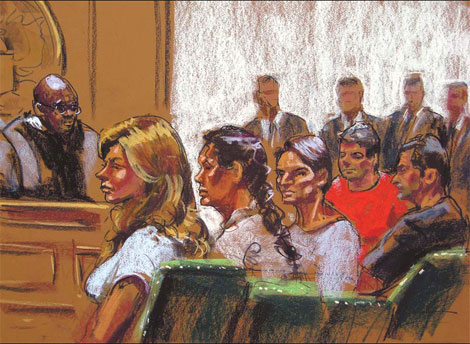-
News >World
Spying lingers long after Cold War
2010-07-01 09:50
Russian spy suspects (from left to right) Anna Chapman, Vicky Pelaez, Richard Murphy, Cynthia Murphy and Juan Lazaro are seen in this courtroom sketch during an appearance at the Manhattan Federal Court in New York on Monday. [Agencies]WASHINGTON - The case reads like the plot from a cheap spy thriller, but analysts say the breakup of an alleged Russian undercover network in the United States shows that espionage remains serious business decades after the Cold War.
"Russia is continuing to spy on the US, as other countries which harbor animosity do," said Ariel Cohen, a Heritage Foundation senior research fellow specializing in security issues.
But he said the indictments of the alleged spies "indicate mostly old and sloppy tradecraft, which reads like a parody on (spy novelist John) Le Carre books from the 1970s, agents who are not well placed or tech-savvy."Because the spy-craft appears unsophisticated, Cohen said, "some old timers from the intelligence community speculated that the network is a decoy to mask a much more sophisticated espionage operation in the US."
Fred Burton, a former State Department intelligence agent who is now vice-president at the security and consulting firm Stratfor, said the arrests after years of surveillance suggest that the network was nearing some key information or knew it had been compromised.
Because the suspects were not charged with espionage but with acting as agents of a foreign government, Burton said the investigation is not complete but that prosecutors "may build an espionage case" later against the group.
Burton said there was "a logical assumption" that more Russian agents and sleeper cells may be operating on US soil and that "one of the results of these takedowns is that you will rattle a few trees that will lead to other people or fill in other parts of other investigations."
The US Justice Department said the 10 "deep-cover" suspects were held on suspicion of seeking details of US nuclear weapons and foreign policy. According to court documents, the spy ring had been under FBI surveillance for a decade.
The case nonetheless reads like a work of fiction, with a glamorous Russian female agent, sleeper cells and cloak-and-dagger secret drops in public places, as one might expect from the Cold War era, even though that ended with the breakup of the Soviet Union in 1991.
"It's not surprising that even when relations are good, countries will continue their intelligence programs against one another. It's what intelligence agencies do," said Olga Oliker, senior international policy analyst at Rand Corp.
But "this strikes me as an odd program, because it's a very organized, well thought-out long term effort that doesn't seem to be all that effective."
Heather Conley, director of the Europe Program at the Center for Strategic and International Studies, said the case shows that foreign governments gather information even on allies to gain advantages in negotiating or other situations.
Conley said retaliatory measures could bring back the Cold War mentality, but downplaying the case could allow relations to move forward.
Cohen of the Heritage Foundation said the Russian ring appeared "very much stuck in the Cold War" but remained cause for concern.
"We should be concerned about any espionage," he said. "Friends don't spy on friends."
Patriotic, anti-American messages adorn the pages of two of the alleged Russian spies on Russia's answer to Facebook, a reminder of historic suspicions and resentments that have survived the end of the Cold War. "Russia will never abandon you!" is the repeated message on the pages of Mikhail Semenko and Anna Chapman. Over 100 people left similar messages on the Russian language social netowrking site odnoklassniki.ru on Wednesday, Reuters reported.
Agence France-Presse
